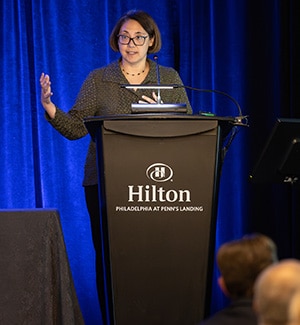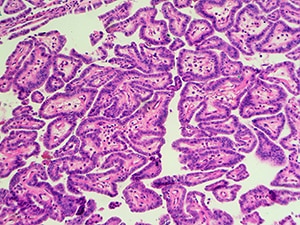In Ancient Greek legends, Sybil was a name bestowed upon prophetesses who were thought capable of predicting the future. Today, can artificial intelligence help create a modern-day Sybil capable of predicting future cases of lung cancer? That was just one of the questions raised at the American Association for Cancer Research (AACR) Industry Roundtable 2024, held October 8-9 in Philadelphia.
This principal event of the AACR Sustaining Membership Program has helped connect corporate partners aligned with the AACR’s mission to prevent and cure cancer with the larger cancer research community. This year, more than 30 attendees from biopharmaceutical companies that are sustaining members were brought together with cancer researchers, AACR leaders, officials from the U.S. Food and Drug Administration (FDA), and patient advocates.
“At the AACR, our Industry Roundtable serves a critical role in advancing our mission by fostering collaboration and opening doors to new partnerships,” said Mitch Stoller, chief philanthropic officer of the AACR Foundation and vice president of development. “These events are where ideas are shared, connections are made, and alliances are forged—all of which drive our ability to advance groundbreaking research.”
The topic at the heart of this year’s event was “Tracking and Treating Early Cancers to Increase Cures,” which included discussions on the latest advancements in early cancer detection, how to design clinical trials for early cancer treatments, the use of therapeutic cancer vaccines in early stages, and more.
“We identified this topic with our industry partners earlier in the year, with consensus that this is a high-priority area in cancer research,” said Lillian L. Siu, MD, FAACR, AACR 2024-2025 president-elect, chair of the Industry Roundtable, and director of the Phase I Clinical Trials Program at Princess Margaret Cancer Centre. “Various formats, including debates, panel discussions, and breakout groups created a highly interactive program for our participants.”
Can AI-powered Cancer Detection See into the Future?
The program kicked off with an AI algorithm called Sybil. Lecia Sequist, MD, MPH, the program director of the Cancer Early Detection and Diagnostics Clinic at Massachusetts General Hospital and the Landry Family Professor of Medicine at Harvard Medical School, delivered the opening keynote centered around her work to modernize lung cancer screening.
Sequist said she saw the need to develop a different approach due to two huge gaps with lung cancer screening. Currently, the U.S. Preventive Services Task Force recommends lung cancer screening for individuals who are 50 to 80 years old, have a 20 pack-year smoking history, and still smoke or quit within the past 15 years, but this has been found to exclude over half of Black patients with lung cancer. It also does not include people who could be getting lung cancer from other risk factors besides tobacco, as 10% to 20% of cases in the United States are now in people who have never smoked or smoked fewer than 100 cigarettes in their life. The other big gap is that less than 10% of those eligible even participate in lung cancer screening.
Sequist partnered with Regina Barzilay, PhD, the School of Engineering distinguished professor for AI and health at the Massachusetts Institute of Technology, and Florian Fintelmann, MD, the head of thoracic imaging percutaneous thermal ablation at Massachusetts General Hospital, to develop a deep learning model capable of predicting lung cancer risk without the need for demographic or clinical data. Unlike similar models that may require radiologists to circle a region of interest to examine, Sybil was built to look at the entire thoracic volume from a CT scan, including variables within the whole body that are picked up by the scan.
The model was trained on data from three cohorts, including the National Lung Screening Trial and low-dose computed tomography (LDCT) imaging from Massachusetts General Hospital, which mostly consisted of white patients with a history of tobacco exposure. Meanwhile, LDCTs from Chang Gung Memorial Hospital in Taiwan included individuals with a range of tobacco history, including nonsmokers.
Sybil showed high accuracy in predicting lung cancer one year prior to diagnosis in all three cohorts, with the highest accuracy found in the Chang Gung Memorial Hospital cohort. Sequist said that this indicated the model’s performance is not dependent on the patient having tobacco exposure. She added that while the model definitely performed better in the short term, they still saw “decent” results in its predictions six years prior to diagnosis.
“I have gone to way too many funerals of young people under the age of 50 dying from lung cancer who never smoked and are not eligible for screening,” Sequist said. “My dream is to be able to use Sybil or another tool like it that helps figure out who’s at risk for lung cancer to bring screening to the general population.”
Sequist is continuing to explore other uses for Sybil, including in predicting lung cancer in firefighters, and added that this open-source model is available on the web and is currently being tested by researchers around the world.
Examining the Short-term Prognosis for AI in Health Care
While Sybil has shown promising results, a later session focused on whether AI-driven technologies would become standard of practice and lead to increased cancer cure rates by 2034. Alexander T. Pearson, MD, PhD, an associate professor of medicine and director of data sciences at the University of Chicago Section of Hematology/Oncology, served as the “realist” tasked with downplaying the immediate impact of AI in what was called a “dialogue.” Vivek Subbiah, MD, the chief of early-phase drug development at the Sarah Cannon Research Institute, served as the “optimist,” highlighting the promise AI has shown so far, including the 2024 Nobel Prize in Physics for discoveries in machine learning and AI.
Alexander T. Pearson, MD, PhD and Vivek Subbiah, MD participated in a dialogue about AI at the AACR Industry Roundtable 2024.
Pearson, however, pointed to four main hurdles that AI will face over the next decade: 1) integrating AI into clinical practice will remain a challenge as medical training for AI is still sparse and patients strongly prefer human interactions for any meaningful health discussions; 2) results have displayed an algorithmic bias with inaccurate connections that can disproportionately affect a particular group; 3) a lack of transparency and inability to explain why AI makes certain connections can lead to mistrust among providers and patients; and 4) a lack of liability guidance from governments can hamper the pace of innovation.
“AI for medicine is totally different than AI for other consumer products,” Pearson said. “We have to rigorously test all of the concepts that we put forward in order to know that they are done on behalf of our patients with the highest standard possible. So even if we have robust models that reliably progress us to a place where we can implement an algorithm on behalf of our patients, that doesn’t mean we are going to—in the next 10 years’ time—reshape the full regulatory landscape in the U.S. in order to speed these technological concepts into the real world.”
Looking Down the Road
Other sessions from the event touched on the impact of patient advocates on research, the challenges and potential solutions in implementing new technologies in early cancers, cancer screening in low- to middle-income countries and underrepresented populations in high-income countries, increasing diversity in clinical trials, and updates from the FDA.
“The 2024 AACR Industry Roundtable was exceptional, featuring a well-rounded agenda focused on early cancer detection and interception,” Siu said. “Rapid advances in molecular biology, immunology, technology, and drug development are making it increasingly feasible to detect and eliminate cancers at an early stage. In collaboration with industry, academia, regulatory partners, survivors, and patient advocacy groups, the AACR will continue to drive progress in this field.”
For next year’s event, the AACR will once again work with industry partners from the Sustaining Membership Program to craft an equally engaging agenda focused on another key area of cancer research.
“This year’s event was particularly impactful in bringing together leaders who share our vision for defeating cancer, and I am excited to see how these relationships will shape the future,” Stoller said. “We’re already looking forward to building on this success next year.”
The post The AACR Industry Roundtable 2024: Detecting and Treating Cancer Early appeared first on American Association for Cancer Research (AACR).



